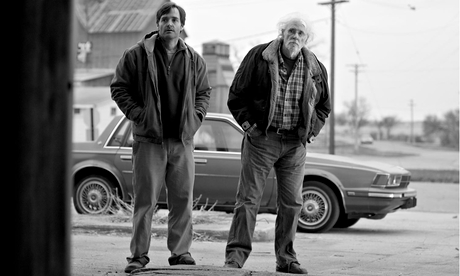
Spring has finally sprung, though on the DVD front that means reliving the winter to some extent, as prestige releases from the colder months trickle down to the small screen. You certainly couldn't watch anything much less seasonal than Nebraska (Paramount, 15), Alexander Payne's stubbornly glum comedy of dreams, dementia and delusion in the midwest.
Shot in a kind of grey and white that doesn't even give its flat landscapes the distinction of severity, it's Payne's first visit to his home state since 2002's sardonic About Schmidt, and he hasn't got sweeter on it with time. As Bruce Dern's addled pensioner chases down the millions promised to him in a lottery scam, pestered by venal relatives and patronised by his immediate family, the film emerges as the director's bleakest satire yet of corrupted American communities. It's also among his shallowest, taking any number of cheap shots at flyover folk while masking its condescension with standard-issue father-son pathos. His critical following remains steadfast, but Payne was a more interesting film-maker when he copped to being a misanthrope.
There are richer rewards to be found in the week's two standout foreign releases, both from highly promising female directors. Suzanne (Studiocanal, 12), Frenchwoman Katell Quillévéré's superior follow-up to her already formidable debut, Love Like Poison, is a daring, wrenching character study of a feckless, working-class woman (brilliantly played by Sara Forestier) that covers 25 years via a breathtaking sequence of chronological leaps. Freshening up familiar social realism with its cool structural elan, it's a film that may well confirm the arrival of a master.
Less pristine but equally fascinating is Fill the Void (Artificial Eye, 15), an uncommonly generous, inquisitive examination of arranged marriages within Israel's Haredi community that aims for the wit and social intricacy of a contemporary Jane Austen tale and mostly succeeds. Venice best actress winner Hadas Yaron glows as our teen protagonist, pressured into marrying her widowed brother-in-law; Rama Burshtein, the first orthodox Jewish woman to make a feature film, details the internal politics of this still-sheltered world with an insider's assurance.
It's a heavy week for big-name straight-to-DVD titles, none stranger than Violet and Daisy (House, 15), an intermittently spiky but daftly conceived gun-slinging fairytale starring Saoirse Ronan and Alexis Bledel as teen assassins, and the late James Gandolfini (dolefully marvellous, as ever) as their prey. It's a dated post-Tarantino hangover, and an unexpected directorial debut for Oscar-winning writer Geoffrey Fletcher (Precious). Still, it's better than Revenge for Jolly (Anchor Bay, 15), a brashly bloody but stilted revenge comedy that Oscar Isaac, Kristen Wiig and Elijah Wood will probably be leaving near the bottom of their respective CVs. Brooke Shields and Virginia Madsen may be prouder of the regrettably titled The Hot Flashes (High Fliers, 15), Susan Seidelman's spirited but eminently disposable comedy about a middle-aged female basketball team, but that's rather for lack of recent alternatives.
Broadcast last autumn on soon-to-be-axed BBC3, Canadian sci-fi series Orphan Black (BBC, 15) met with less fanfare here than in North America, where critics were united in their gushing praise for Tatiana Maslany as a series of human clones uncovering the knotty conspiracy behind their origin. And rightly so: she's entirely remarkable, flipping between identities with acrobatic intelligence. The series itself isn't quite as special – a slightly more eggheaded version of JJ Abrams's Alias, not that that's a bad thing – but it's engrossing stuff with room to grow.
The 20th anniversary of the Rwandan genocide and its still-rocky aftermath has been much in the news in recent weeks, which makes Mubi's streaming of Anne Aghion's excellent 2009 documentary My Neighbor, My Killer the week's most fortuitously timed online release. The product of 10 years of filming in the village of Gafumba, the film charts the progress of the government's public Gacaca tribunals intended to initiate reconciliation between the Hutu and Tutsi communities; the resulting revelations from both sides are raw and frequently surprising. Never released in the UK, it deserves a look now.

